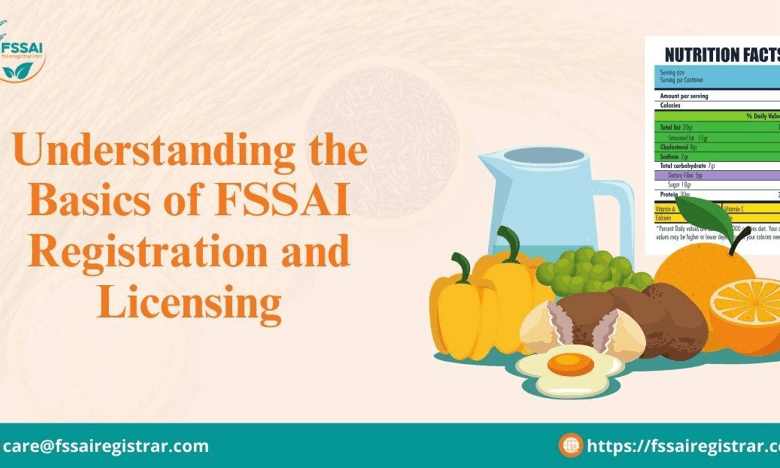Understanding the Basics of FSSAI Registration and Licensing

The Food Safety and Standards Authority of India (FSSAI) is a statutory body established under the Food Safety and Standards Act, of 2006. It is responsible for ensuring food safety and regulating the food industry in India. FSSAI registration and licensing are mandatory for all food businesses operating in India to ensure that the food products meet the required safety and quality standards. Here’s a detailed guide to understanding the basics of FSSAI registration and licensing.
1. What is FSSAI?
FSSAI stands for the Food Safety and Standards Authority of India. It is an autonomous body under the Ministry of Health and Family Welfare, Government of India. FSSAI is responsible for protecting and promoting public health through the regulation and supervision of food safety.
2. Why is FSSAI Registration and Licensing Important?
FSSAI registration and licensing are crucial for several reasons:
- Consumer Safety: Ensures that the food consumed by the public is safe and meets quality standards.
- Legal Requirement: Compliance with the law to avoid penalties and legal actions.
- Consumer Confidence: Builds trust among consumers regarding the safety and quality of the food products.
- Market Access: Enables businesses to expand their operations legally and reach more markets.
3. Types of FSSAI Registration and Licensing
FSSAI offers different types of registrations and licenses based on the size and nature of the food business:
A. Basic FSSAI Registration
- Eligibility: For small food businesses with an annual turnover of up to INR 12 lakhs.
- Examples: Small retailers, hawkers, petty food manufacturers, and small-scale industries.
Process: Apply online via the FSSAI website and provide basic details about the business.
B. State FSSAI License
- Eligibility: For medium-sized food businesses with an annual turnover between INR 12 lakhs and INR 20 crores.
- Examples: Small to medium-sized manufacturers, storage units, transporters, retailers, marketers, and distributors.
- Process: Apply online via the FSSAI website, submit necessary documents, and undergo inspection by state authorities.
C. Central FSSAI License
- Eligibility: For large food businesses with an annual turnover exceeding INR 20 crores or those engaged in import/export.
- Examples: Large manufacturers, 100% export-oriented units, large-scale importers, and food business operators in Central Government agencies.
- Process: Apply online via the FSSAI website, submit necessary documents, and undergo inspection by central authorities.
Read also: Mindfulness in the Age of Apps: A Journey Through Digital Serenity
4. Steps for FSSAI Registration and Licensing
The process of obtaining FSSAI registration and licensing involves several steps:
Step 1: Determine the Type of Registration/License
Identify whether your business requires Basic Registration, State License, or Central License based on its scale and turnover.
Step 2: Gather Necessary Documents
Prepare the necessary documents, which typically include:
- Proof of identity (e.g., PAN card, Aadhar card)
- Proof of business ownership (e.g., rental agreement, utility bill)
- Food safety management plan
- List of food products to be handled
- Incorporation certificate (for companies)
- Import/export code (for importers/exporters)
Step 3: Apply Online
- Visit the FSSAI online portal (https://foodlicensing.fssai.gov.in).
- Fill out the application form with the required details.
- Upload the necessary documents.
- Pay the applicable fees.
- Now, the applicant will receive the fssai license in their registered email-id.
5. Renewal of FSSAI License
FSSAI licenses are valid for a period ranging from 1 to 5 years, as chosen by the food business operator. It is essential to renew the license before its expiry to avoid penalties. The renewal process is similar to the initial application process and should be initiated at least 30 days before the expiration date.
6. Penalties for Non-Compliance
Non-compliance with FSSAI regulations can result in severe penalties, including:
- Fines and monetary penalties.
- Suspension or cancellation of the FSSAI license.
- Legal actions, including imprisonment for severe violations.
7. Benefits of FSSAI Registration and Licensing
- Enhanced Credibility: Increases the credibility of the food business in the eyes of consumers and stakeholders.
- Legal Advantage: Ensures the business operates legally and adheres to food safety standards.
- Market Expansion: Facilitates expansion into new markets and customer segments.
- Quality Assurance: Helps maintain high food quality standards, leading to customer satisfaction and loyalty.
Note: Now easily apply for fssai license renewal through fssai portal.
Conclusion
FSSAI registration and licensing are fundamental to ensuring food safety and quality in India. By complying with FSSAI regulations, food businesses can protect consumers, avoid legal issues, and enhance their market credibility. Whether you run a small food stall or a large manufacturing unit, understanding and obtaining the appropriate FSSAI registration or license is essential for your business’s success and sustainability.






